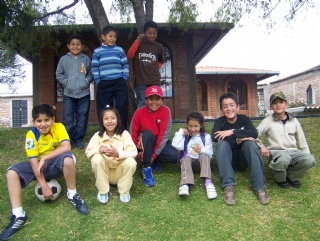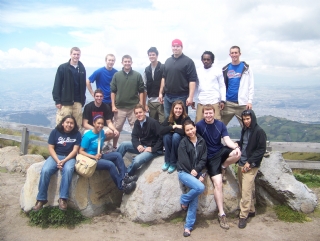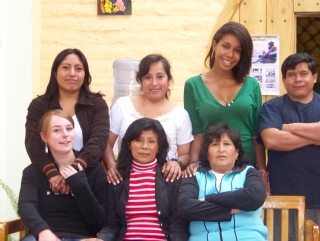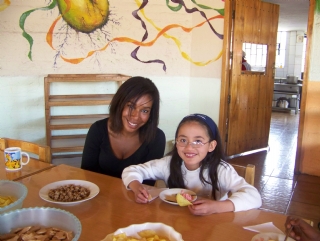Danyeal H. Roseman '11
September 1, 2009
After a two-week service trip with the DePauw in Ecuador Program as a first-year student in 2007, Danyeal “Danni” H. Roseman ’11 was hooked on the South American country and determined to find a way to return. Created by a major gift from Steven L. Trulaske ’79 and his wife, Michelle, the DePauw in Ecuador Program combines a three-week on-campus experience and a two-week service trip to Quito, Ecuador. Robert P. Hershberger, associate professor of modern languages (Spanish), and chair of the Modern Languages Department worked with Trulaske in 2006 to develop the program. Hershberger was a program faculty adviser in 2007 and 2009.
Roseman says, “The DePauw in Ecuador Program was amazing. In fact, it’s the reason I came to DePauw.” Roseman, an English literature and Spanish double major, is very grateful for the opportunities the program has given her and for the contacts she’s made.
In Ecuador, Roseman met V. Daniel Rogers, associate professor of modern languages and chair of the modern languages department at Wabash College. Rogers coordinates the Wabash Summer Study in Ecuador Program. For the last several years, Wabash has accepted two DePauw students to participate in the four-week summer program. In turn, DePauw accepts two Wabash students as student leaders in the DePauw in Ecuador Program.
After meeting Rogers and learning about Wabash’s program, Roseman decided that she would apply. Last spring, she was accepted along with Carolyn C. Latta ’12, who has also participated in the DePauw in Ecuador Program.
DePauw in Ecuador Program.
Rogers says, “Danni Roseman made an important contribution to our Ecuador program this summer. Her previous experience in Ecuador, knowledge of the culture, and deep commitment to issues of poverty and education made her a real asset. Her participation helped demonstrate the value of the ongoing collaboration between our schools.”
The Wabash students (above) were very supportive of both Roseman and Latta. “They were protective of us,” Roseman says. “We joked about them referring to DePauw students as ‘Dannies,’ especially with my name, Danni!”
The students spent the first two weeks in Ecuador living with host families, reading historical and indigenous novels as well as short stories, and meeting with the authors. The final two weeks were spent working on service projects. Roseman says that while the entire four weeks were incredible, a highlight included living in the jungle for a week.
The students stayed at Yachana Technical School located in the Amazon River Basin along the banks of the Napo River. Yachana means “a place for learning” in the indigenous Quichua language. “The high school students living there are trilingual,” Roseman explains. “They speak Spanish, English and Quichua, spend one month at the school and then return to their villages for a month to share what they learned at Yachana.” The focus of education at Yachana is on conservation and sustainable development. Roseman was impressed by their ingenuity. “The Yachana students made their own water filters and cross-bred a lemon tree with an orange tree,” she says.
Her experience in the rainforest made her think about things that she takes for granted in the United States. “We had electricity for only a few hours each day, large banana spiders crawling around and mudslides to avoid on our daily trips to the Yachana Lodge for meetings.”
After the Wabash program ended, Roseman stayed in Ecuador for an additional six weeks to teach English in southern Quito at a community outreach center. “I had stayed at the Centro Mons Señor Leonidas Proaño with the DePauw in Ecuador Program, so I was familiar with it,” she says. Roseman planned to work in an orphanage there but realized that once she arrived, it wasn’t going to work out for various reasons. “I was disappointed at first to learn that I couldn’t work there but  realized that working with any kids in southern Quito was going to be just as rewarding.”
realized that working with any kids in southern Quito was going to be just as rewarding.”
Roseman compares the center to a YMCA in the United States. The center offers special programs for the community, including soccer camps and English classes. However, Roseman’s class was unique to the center. “It was the first time the center offered an intensive class that met for six weeks,” she says.
“I taught four classes a day to students ranging in age from elementary school to adults (above). My students were very receptive and were eager to learn English.”
Hershberger says, "Danni's desire to return to Ecuador this summer in order to teach English at the Centro Monseñor Leonidas Proaño - the same place where she stayed as a student when she participated in the DePauw in Ecuador Program of 2007 - was particularly gratifying. It meant that her first visit to Ecuador had planted a seed, which later blossomed into a passionate resolve to return. I also give Danni a lot of credit: She turned a dream into a reality. It's exciting when a student begins her life's work now, instead of waiting until she graduates."
Roseman is thinking about returning to Ecuador next summer. She’s been invited back by the staff at the center in Quito. They are encouraging her to return, and to stay there free of charge.
“I learned from my experiences living in Ecuador that trying to decide the color of an iPhone is very insignificant. I learned a lot from people who had very little but shared everything with me. The Ecuador people are about community and sharing. Experiencing that was very rewarding,” she says.
Ecuador people are about community and sharing. Experiencing that was very rewarding,” she says.
Roseman is surprised that many Americans don’t think of vacationing in Ecuador. “Ecuador has everything: mountains, volcanoes, jungle, coast, islands, big city and country life. I think it’s underrated and under appreciated.” She says that Ecuador offers great cultural diversity, not to mention great food.
“I wasn’t sad to leave Ecuador because I know I’ll go back,” Roseman says. “It was more like saying, chao or see you later rather than saying adios or good-bye.”